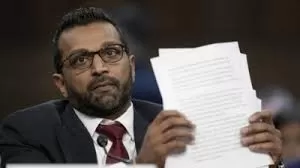Kash Patel: The Indian-American at the Heart of Controversy Over FBI Leadership
Kash Patel, an Indian-American lawyer, former government prosecutor, and staunch ally of former President Donald Trump, is at the center of a political firestorm as he vies for the position of FBI Director.

His nomination by Trump has been met with both celebration and strong opposition, with supporters hailing his rise as a testament to his loyalty and achievements, while critics question his controversial stance on key issues and his approach to law enforcement.
A Family Affair: Patel’s Roots and the Confirmation Hearing
During his confirmation hearing for the position of FBI Director, Kash Patel made it clear that his Indian heritage played a significant role in shaping who he is today. The son of Indian immigrants, Patel addressed his parents in Gujarati, a gesture that resonated with his supporters. "J Shri Krishna," he said, greeting his family who had traveled from India to attend the hearing. His personal connection to India has made him a source of pride for many in the Indian-American community, with Trump supporters in India celebrating his rise in American politics.
However, the celebration was tempered by the fierce grilling Patel received from Democratic lawmakers during the hearing. The Democrats were quick to express their concerns about Patel's suitability for the role of FBI Director, given his past associations and positions.
The Controversial Legacy of Kash Patel
Kash Patel’s career has been marked by his unwavering loyalty to Donald Trump and his involvement in some of the most controversial moments of Trump’s presidency. A key adviser during Trump’s first term, Patel earned a reputation for challenging the deep state and pushing back against what he saw as the establishment’s opposition to Trump’s agenda. His appointment as FBI Director is seen by many as a reward for his loyalty to Trump and a potential shift in the FBI’s direction.
One of the most contentious aspects of Patel’s history is his role in promoting conspiracy theories. In his memoir Government Gangsters, Patel has referred to high-ranking officials in the FBI as "crooks" and "gangsters." He has even called for their firing. His book contains an “enemies list” that includes names such as former President Joe Biden, former Attorney General Merrick Garland, and former National Security Adviser John Bolton. These individuals, Patel claims, are part of a so-called “deep state” that has worked against Trump’s interests.
Patel’s list of enemies stretches to 60 individuals, and he has publicly stated that they “deserve to be punished.” His rhetoric and views have raised alarms among many, especially those concerned about the potential abuse of power if he were to be confirmed as FBI Director. Critics argue that Patel’s history of politically charged commentary makes it unlikely he would be able to lead the FBI without bias, particularly when it comes to investigating individuals associated with Trump’s political rivals.
Democratic Opposition: Concerns Over Bias and Political Motivations
The opposition from the Democrats has been staunch. They argue that Patel’s past statements and actions indicate a propensity for politicizing law enforcement and using the FBI as a tool to punish political opponents. His book, which targets key figures in the political establishment, is seen as evidence of his personal vendettas rather than a commitment to impartial justice.
The Democrats also raised questions about Patel’s stance on the 2020 presidential election, which remains a sensitive subject. During the confirmation hearing, Senator Dick Durbin pressed Patel on whether he would publicly acknowledge that Joe Biden won the 2020 election. Patel's response was direct but insufficient for some. He acknowledged Biden’s victory but implied that he had trouble saying it. His refusal to unequivocally affirm the results was seen by many as an attempt to appease Trump’s supporters, which further fueled concerns about his ability to lead a non-partisan FBI.
Patel’s connections to the January 6th Capitol riot were another point of contention. He had previously referred to the individuals involved in the insurrection as “political prisoners” and had even raised funds to support them. While he distanced himself from any endorsement of violence, Patel’s comments on the rioters raised eyebrows, especially when questioned about the blanket pardons Trump granted to over 1,600 individuals involved in the riot. When asked whether he thought it was appropriate for Trump to pardon the rioters, Patel seemed to soften his position, stating that while he advocated for imprisoning those who harmed law enforcement, he had not reviewed all the cases individually.
Republican Support: Patel’s Likely Path to Confirmation
Despite the fierce opposition from Democrats, Patel’s confirmation is likely to proceed. The Republicans hold the majority in the Senate, and most have not voiced any objection to Patel’s nomination. His loyalty to Trump and his status as a trusted figure within Trump’s inner circle have solidified his position as a strong contender for the role of FBI Director.
In the end, while the Democrats are trying to rally against Patel’s confirmation, they face an uphill battle. With Republicans backing his nomination and the likelihood of limited resistance in the Senate, it seems Patel’s confirmation is all but certain. However, the confirmation hearing has brought to light serious concerns about his suitability for the role, particularly in terms of impartiality and the potential politicization of the FBI.
What’s Next for Kash Patel?
If confirmed, Patel would take the helm of the FBI at a time when the agency’s credibility and independence are under scrutiny, especially in the wake of the investigation into Trump’s actions during his presidency. Patel’s leadership could shape the agency’s direction for years to come, and his past views and affiliations will undoubtedly influence how he is perceived both inside and outside the Bureau.
The implications of Patel’s potential confirmation extend beyond just the FBI. Given his outspoken support for Trump and his history of challenging the political establishment, his appointment could further deepen the divide between the two major political parties in the United States. His tenure as FBI Director could become a flashpoint for future political battles, especially if he is seen as using the agency to target political opponents.
Conclusion: A Divisive Nomination
Kash Patel’s nomination as FBI Director has ignited a fierce debate about loyalty, partisanship, and the future of law enforcement in the United States. While his supporters view him as a champion of justice and a defender of Trump’s policies, his critics argue that his history of conspiracy theories and political animosity make him unfit to lead an agency that is supposed to operate without bias. As the confirmation process unfolds, the tension surrounding Patel’s nomination will only continue to rise, with the outcome potentially reshaping the direction of the FBI and its role in American politics for years to come.
What's Your Reaction?
















